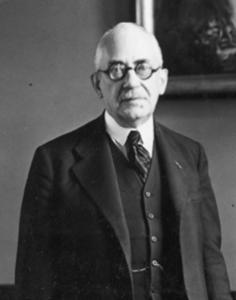Gusztáv Gratz (1875-1944), Hungarian journalist, economist, politician and diplomat.
© Article written by Gabriel Godeffroy for the Central Europe Foundation
Photo: “Gusztáv Gratz”, 1938, Polish State Archives
After receiving his doctorate in Political Sciences at the University of Budapest in 1898, Gusztáv Gratz started his career as a journalist. Later, in 1906, he became a Member of the Hungarian Parliament as a representative of the Transylvanian Saxons.
In 1912, Gratz took up the position of managing director of the Hungarian Association of Factory Industrialists. During the First World War, he was particularly active in the Central European movement, which promoted the idea of an economic rapprochement between Germany and Austria-Hungary. He was trying to find a formula “that would provide some protection for the Hungarian industry within the [German-Austro-Hungarian] economic alliance”. In 1917, he was named head of the Foreign Trade Section of the common Foreign Ministry of Austria-Hungary in Vienna. After a change of government in Hungary, he was shortly Finance Minister, before returning to his position at the Foreign Ministry. From 1917 to 1918, he participated not only in the economic negotiations with Germany about a Central European economic union, but also in the peace negotiations in Brest-Litovsk and Bucharest.
After the collapse of Austria-Hungary and the political instability in Hungary, which followed the First World War, Gusztáv Gratz was appointed Hungarian Ambassador in Vienna, before becoming Hungarian Foreign Minister in January 1921. In this capacity, Gratz envisaged economic and political cooperation between the Successor states of Austria-Hungary to stabilize the region within the new international order. After supporting the two failed restauration attempts of the former King of Hungary Charles, Gratz was sidelined from Hungarian politics. In 1926, he reentered the Hungarian Parliament as a representative of the German minority in Hungary.
From 1925, Gusztáv Gratz was the editor of the Hungarian Economic Yearbook, which presented an overview of the economic situation in Hungary after the disintegration of the economic area of Austria-Hungary. Like Elemér Hantos, Gratz advocated an economic rapprochement between the Successor states of Austria-Hungary as the first step towards an European Economic and Customs Union and participated in the activities of the Central European Economic Congress and the Pan-European Union. From 1930, he was the president of the Central European Institute in Budapest, founded by Elemér Hantos.
--Gusztáv Gratz: “Zunächst Regionalabkommen” (Prager Tagblatt, 24. September 1926, p. 1)
--Vince Páal und Gerhard Seewann (Hrsg.), Augenzeuge dreier Epochen: Die Memoiren des ungarischen Außenministers Gustav Gratz, München: R. Oldenbourg, 2009.
Click here for full biography in Wikipedia.

